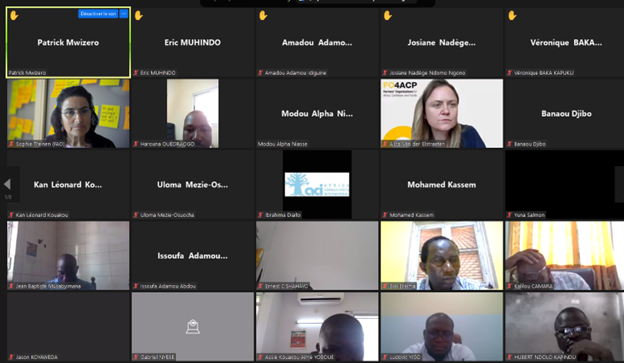The third of the six webinars in the series on experience capitalization was dedicated to the first part of the implementation phase of the capitalization process: the collection, organization and analysis of data and information. It took place on 2 May and was attended by more than 200 YenKasa Africa partners. The second part of the implementation phase is documentation and sharing and will be the subject of the 4th webinar, which will take place on 23 May at 11 AM CEST. Mark your calendars!
Since the end of March, the regional initiative YenKasa Africa has been organizing a series of webinars on capitalizing on experiences in collaboration with the Food and Agriculture Organization of the United Nations (FAO) and the International Fund for Agricultural Development (IFAD), with its OPenACP Programme -FO4ACP.
Experience capitalization is a systematic, iterative, and participatory process of analysing and documenting experiences, leading to knowledge that can be shared and used to generate change. This methodology is crucial for organizations to learn from past experiences and improve future performance. Experience capitalization can be applied to different sectors of activity in different contexts, including agriculture, fisheries, forestry, health, education and many others.
The process of experience capitalization can be divided into four phases:
- Preparation (webinar 2)
- Implementation (webinars 3 and 4)
- Generating change (webinar 5)
- Facilitation (webinar 3)
The 3rd webinar addressed the stages of data and information collection, organization and analysis. It also highlighted the importance of facilitation in the process.
Facilitation tools and methods allow for further analysis. It is essential not to limit oneself to describing what has been done and the results achieved but to specify how and why they were achieved this way. As capitalization is a participatory process, having different sources of information and encouraging diverse views is important, as this will enrich the learning process.
Through this series of webinars, YenKasa Africa, a communication initiative for family farming and rural development in Africa, is developing the capacity of its members to share their knowledge and experiences better.
The webinars complement and do not replace the online course on “Experience Capitalization for continuous learning” available on the FAO Digital Academy website. The online course is available in four languages: English, French, Spanish and Russian. To find out how to access the content of this course on learning from experience, we invite you to watch this video.
As a reminder, the first of six webinars introduced the online course units. It emphasized the importance of capitalization in a participatory way, involving all stakeholders in the capitalization process to ensure that many views and, therefore, different lived experiences are considered.
The 2nd webinar was devoted to preparing the experience capitalization process, comprising two stages: framing and planning.
The 3rd webinar focused on collecting, organizing and analysing data and information.
You can watch or re-watch these webinars on YenKasa Africa’s YouTube channel and the full version on the YenKasa Africa Facebook page.
The exchange with participants continues after each webinar in the community of practice on experience capitalization: Dgroups. By joining this community of practice of 350 members, you will have access to the presentations, to the history of questions and answers, and above all, you will be able to ask your questions.
If you want to stay informed about YenKasa Africa’s activities, sign up for our monthly newsletter.
Register now for upcoming webinars by clicking HERE.

